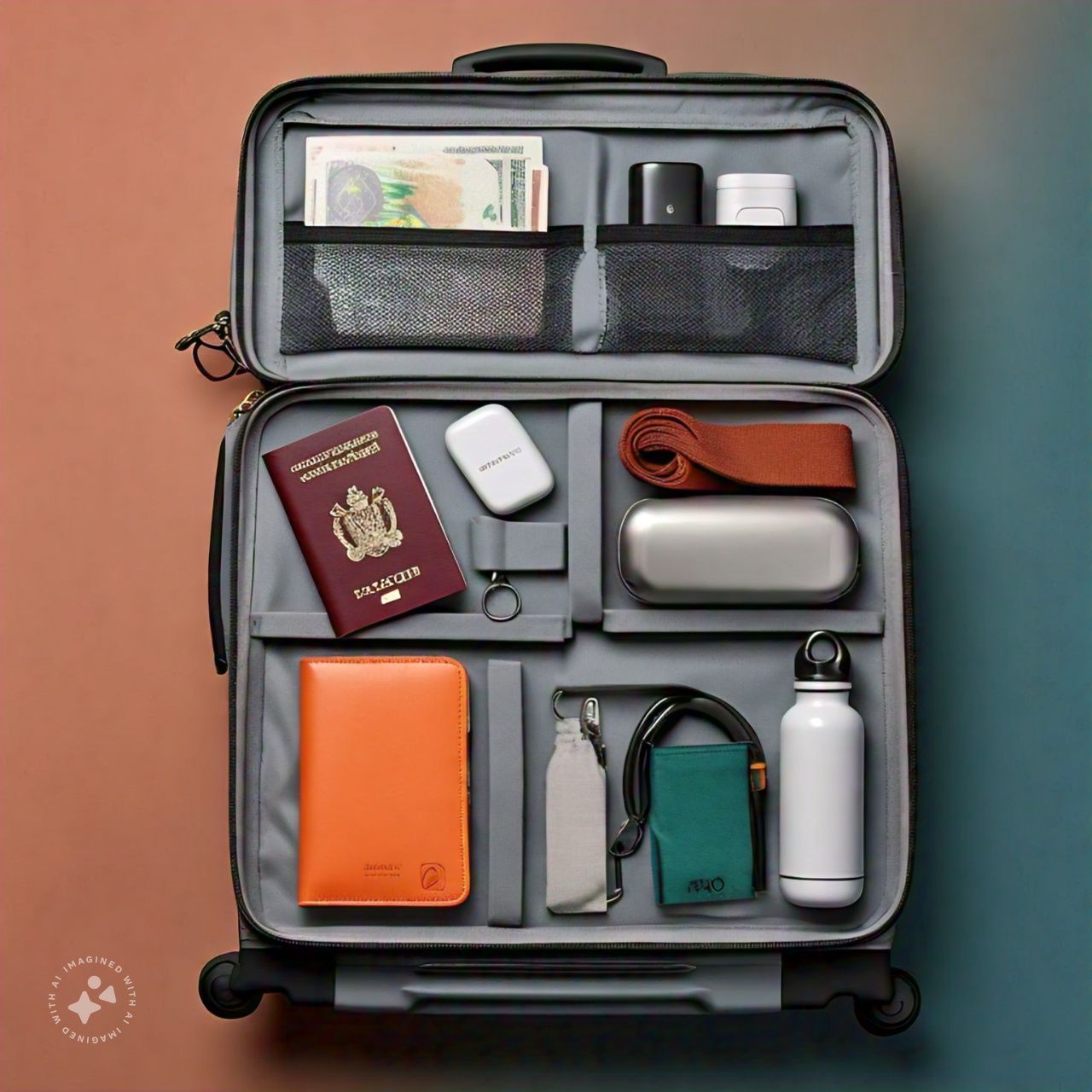5 Things You Should Never Forget to Pack for an International Trip

Traveling internationally is thrilling, but forgetting crucial items can turn your adventure into a stressful experience. While there’s always a chance to pick up last-minute essentials at the airport, some things are non-negotiable and must be packed beforehand. Here’s a simple guide on the top five things you should never forget to pack for an international trip.
1. Passport and Important Documents
Your passport is the single most important item for international travel. Without it, your trip won’t even get started. Make sure your passport is valid for at least six months beyond your travel dates and that you’ve printed or saved digital copies of all your travel documents, such as flight tickets, hotel bookings, and any necessary visas. Having photocopies of your passport is also a good backup plan in case it gets lost or stolen.
Tip: Keep your passport and documents in a secure, easy-to-access location in your carry-on bag. An RFID-blocking passport holder can also protect your sensitive information from unauthorized scans.
2. Universal Travel Adapter
Different countries have different plug types, and if you forget to pack a universal travel adapter, charging your devices could become a real headache. A good-quality adapter can handle plugs from almost any country, ensuring that your phone, laptop, and other gadgets stay powered throughout your trip.
Highlight: A universal travel adapter is a must-pack item if you want to stay connected and keep your devices charged while abroad.
3. Local Currency or Credit Cards
Having local currency on hand is essential, especially for smaller expenses such as transportation or meals in places where cards aren’t accepted. Though many countries accept credit and debit cards, it’s always wise to have some cash for emergencies or for places that prefer cash payments. Also, make sure your credit cards are accepted internationally and inform your bank about your travel plans to avoid unexpected freezes.
Highlight: Don’t forget to pack local currency or internationally accepted credit cards to ensure you can make transactions smoothly wherever you are.
4. Travel Insurance and Health Essentials
Travel insurance may seem optional, but it can be a lifesaver when you’re in a foreign country. It covers unexpected events like lost baggage, canceled flights, or even medical emergencies. Also, packing a basic first aid kit and prescription medications is crucial. Some countries may not have easy access to the medicines you’re used to, so be sure to pack enough for the duration of your trip.
Tip: Don’t forget to bring copies of your insurance policy and emergency contact numbers, just in case you need them.
5. Comfortable Shoes and Weather-Appropriate Clothing
Packing comfortable shoes is essential, especially if you plan to explore a new city on foot. Walking for hours in uncomfortable shoes can ruin your experience. Additionally, make sure to pack clothes that are appropriate for the weather at your destination. Always check the forecast before you pack to avoid being caught off guard by unexpected temperatures or rain.
5 Cons of International Trips
While traveling internationally can be a rewarding and exciting experience, it also comes with its challenges. These cons might not necessarily ruin your trip, but they’re important to consider when planning your journey. Here are five potential downsides of international travel:
1. Language Barriers
One of the most common challenges of international travel is the language barrier. If you don’t speak the local language, even simple tasks like ordering food, asking for directions, or reading signs can become difficult. Miscommunication can lead to frustration, and in some cases, it may even put you in uncomfortable or risky situations.
Solution: Learn a few basic phrases in the local language or use translation apps to help you communicate.
2. Jet Lag and Fatigue
Long-haul flights across multiple time zones can leave you feeling exhausted and disoriented. Jet lag can disrupt your sleep patterns, leaving you tired and unable to fully enjoy your trip. It may take several days to adjust, especially if there is a significant time difference between your home and destination.
Solution: Give yourself time to adjust by arriving a day early or planning light activities for the first couple of days.
Top 10 Must-Have Travel Accessories for a Hassle-Free Trip
3. High Costs
International travel can be expensive, especially when you factor in flights, accommodation, meals, and activities. Some destinations also have a high cost of living, which can quickly add up, particularly if you’re visiting popular tourist spots. Currency exchange rates can also fluctuate, adding an extra layer of financial uncertainty.
Solution: Plan a budget in advance, look for deals, and choose less touristy destinations to save money.
4. Cultural Differences and Social Norms
Every country has its own customs, traditions, and social norms, which can sometimes be confusing or uncomfortable for travelers. Things like tipping, greeting people, or even using public transportation can be different than what you’re used to. Not following local customs can accidentally offend people or make situations awkward.
Solution: Research the culture and customs of your destination before you go to avoid any misunderstandings.
5. Health and Safety Concerns
Traveling to unfamiliar places can present health and safety challenges. In some countries, access to clean water, reliable healthcare, or safe food may be limited. There’s also the risk of getting sick from foodborne illnesses or exposure to new diseases. Safety concerns like petty theft, scams, or getting lost in unfamiliar areas can also pose risks.
Solution: Always travel with health insurance, pack a basic first aid kit, and stay aware of your surroundings to ensure your safety.
Tip: Layering is always a smart choice. You can adjust your outfit based on the weather changes throughout the day.
Conclusion:
Preparing for an international trip takes a bit of planning, but by remembering these five must-pack essentials—passport, universal travel adapter, local currency, travel insurance, and comfortable clothing—you’ll be ready to travel with peace of mind. Don’t leave home without these critical items to ensure a smooth and enjoyable adventure.
Q&A:
- Why is a passport the most important travel item?
A passport is necessary for entry and exit in every country. Without it, you won’t be able to travel internationally. - Why should I bring a universal travel adapter?
Countries use different plug types. A universal travel adapter ensures your devices stay charged no matter where you are. - Can I rely only on credit cards when traveling internationally?
Credit cards are useful, but having local currency is important, especially for smaller transactions or in places where cards are not accepted. - Is travel insurance really necessary?
Yes, travel insurance covers unforeseen situations like lost luggage, flight cancellations, or medical emergencies, saving you from financial stress. - What if I forget to pack local currency?
You can usually exchange money at the airport, but it’s best to bring some beforehand to avoid high fees and ensure you have cash on hand upon arrival. - Why should I notify my bank before traveling?
Informing your bank prevents them from flagging your international transactions as fraud, ensuring your cards work properly abroad. - Can I buy travel essentials like adapters or medicine abroad?
Yes, but it’s better to pack them in advance to avoid high prices or difficulty finding what you need in a foreign country. - What clothing should I pack for unpredictable weather?
Layering is key. Pack clothing you can easily adjust depending on the weather, and always check the local forecast before packing. - How can I protect my important documents?
Keep digital and physical copies of your passport, visas, and travel insurance. Use an RFID-blocking passport holder for added security. - What’s the best way to pack for comfort?
Comfortable shoes and clothes suitable for the destination’s weather are essential for enjoying your trip without discomfort.
By ensuring these essentials are in your luggage, you’ll be well-prepared for any international trip. Safe travels!



